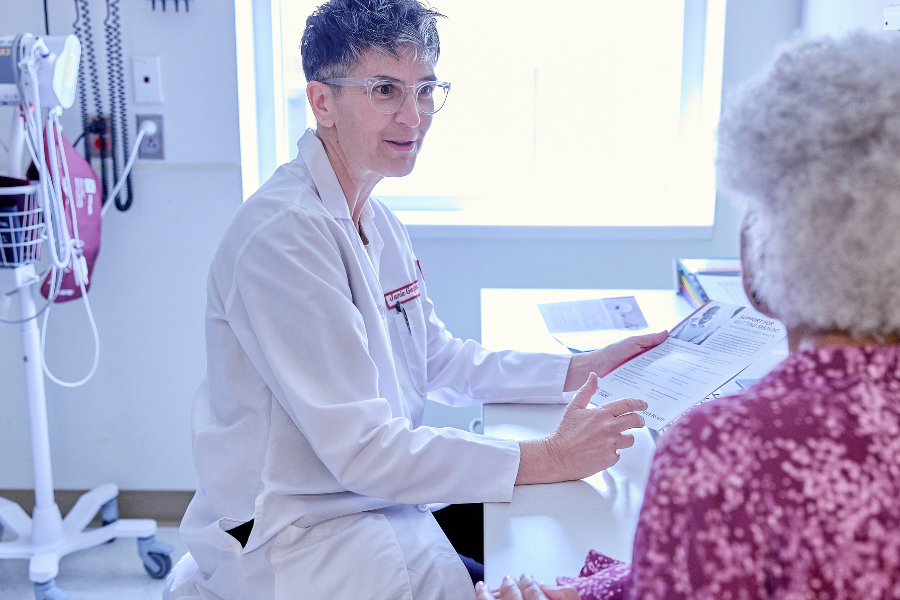 As the Nurse Coordinator for Advanced Lung Disease and the Smoking Cessation Program at the Temple Lung Center, I assist with a patient’s journey to quit smoking. Through our smoking cessation plan and our weekly support group meetings, we can help patients finally kick the habit. However, we recognize beginning this journey is not easy. As with most things in life, success is greater when you are educated and informed.
As the Nurse Coordinator for Advanced Lung Disease and the Smoking Cessation Program at the Temple Lung Center, I assist with a patient’s journey to quit smoking. Through our smoking cessation plan and our weekly support group meetings, we can help patients finally kick the habit. However, we recognize beginning this journey is not easy. As with most things in life, success is greater when you are educated and informed.
Patients often struggle with quitting because they feel smoking calms their nerves. Nicotine binds to receptors of the brain which release dopamine with each inhalation. Dopamine is a chemical of the brain associated with pleasure and calmness. However, it is the other ingredients of toxic carcinogenics that contribute to disease.
Your Heart & Lungs Will Thank You
There are some medical conditions where patients should quit smoking as soon as possible. For example, chronic obstructive pulmonary disease (COPD) is often caused by smoking. It is the accumulated deposit of the toxins from the cigarette smoke that affects the lung’s structure and function. Quitting smoking is the single most important intervention to prevent progression of this lung disease. Our lungs have a natural history of decline with age, and smoking cigarettes accelerates that decline. The longer and more cigarettes smoked, the risk for vascular and heart disease increases.
The beginning of 2017 is an ideal time to take your health in a positive direction. Did you know that cigarette smoking reduces life expectancy by ten years compared to a nonsmoker? Cigarette smoking harms nearly every organ of your body, especially your heart, and is a contributor of several cancers, specifically lung cancer. The benefits of quitting smoking are immediate, ranging from the body’s response to the decrease in the intake of toxins in cigarettes, to the money saved from purchasing. Within eight hours, carbon monoxide levels in the blood drop to normal; the risk for heart attack decreases after 24 hours, and after 48 hours, your sense of smell and taste improves. After just weeks, circulation and breathing improves.
Give It Another Try
If you have tried once or twice to quit smoking and have failed, don’t be discouraged. Studies have shown that not only is nicotine addictive based on the receptors it attaches to in the brain, it is also easily accessible. Therefore, studies further show that it can take the average cigarette smoker seven attempts at quitting before becoming successful. Our goal is to give you the confidence in starting the journey to quit.
A New Perspective on Life
I love watching my patients succeed and achieve their goals. Hearing about their lives and how much they feel they are improving fuels my passion. One patient’s journey always sticks with me. She was 50 years old at the beginning of her journey, was overweight and suffered from depression. She smoked up to 2 packs per day for more than 30 years. She was unhappy with her life, and was determined to make a positive change by quitting smoking.
With the assistance of the Temple Lung Center smoking cessation support group she was able to accomplish this goal. Today, she is celebrating four years smoking-free. She returned to the support group to talk about how once she stopped smoking, it changed her life. Her weight decreased, her health improved, and she has had no hospitalizations since quitting.
One of her main motivations for quitting was her grandchildren. Since quitting, one of the things she is most happy about is that she can now get up with less effort to prepare her grandson meals, walk him to school, attend his school trips, and be an active participant in the home and school association. Also, with the money saved since she has stopped smoking, she has rewarded herself with a vacation each year.
I have heard many stories such as this one throughout my career at the Temple Lung Center. It is always clear that patients’ lives can significantly improve once they quit smoking. I also stress to my patients that they are not alone. They have our staff and the smoking cessation support group members to help them in every step of the process. I also encourage patients to receive added support by calling the PA Free Quitline at any time when they are struggling (800-QUIT-NOW).
Success in Numbers
The Temple Lung Center’s weekly smoking cessation support group is a great asset to assist in the journey to quit smoking. The group setting is often found to be helpful because it allows the opportunity to openly express, with others who can relate, the frustration and the struggle with what has become a long hard habit to break, and allows the opportunity to recognize accomplishments.
Held in a round-table setting, the session allows participants to be in a safe, comfortable, nonjudgmental, and pressure-free environment where they can openly express their thoughts and feelings. During the meetings, discussions focus on education, smoking risks and the health benefits of stopping, tips on how to break the habit, and medical information about nicotine replacement therapy.
The support group meeting is held every Tuesday at 2:00 p.m. to 3:00 p.m. at Temple University Hospital. To register, or for additional information, please contact me at 215-707-5124 or send an email to [email protected].

